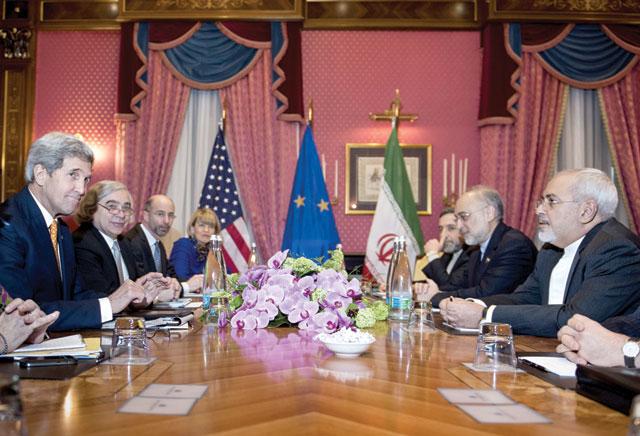You are here
Top US, Iranian nuke officials joining Iran talks
By AP - Feb 21,2015 - Last updated at Feb 21,2015
GENEVA — Top nuclear officials of Iran and the United States joined seven-nation talks Saturday in a move that may help resolve technical disputes standing it the way of a deal meant to curb Tehran's atomic activities in exchange for sanctions relief for the Islamic Republic.
Technical experts for Iran and the six nations it is negotiating with have been meeting alongside senior political officials. But Saturday was the first time that Iranian Atomic Energy chief Ali Akbar Salehi and US Energy Secretary Ernest Moniz also joined in.
Western officials say the US decided to send Moniz only after Iran announced that Salehi will be coming. Still, their presence could improve chances of a deal by fast-tracking complex technical details of constraints on Iran's nuclear programmes that are acceptable to Tehran.
They were expected to discuss the number of centrifuges Iran can operate to enrich uranium; how much enriched material it can stockpile; what research and development it may pursue related to enrichment, and the future of a planned heavy water reactor that could produce substantial amounts of plutonium — like enriched uranium, a potential pathway to nuclear arms.
Iranian Foreign Minister Mohammad Javad Zarif is also at the talks, with US Secretary of State John Kerry scheduled to join Sunday and Monday.
For months, the negotiations have been primarily between Washington and Tehran. But in London, Kerry insisted “there is absolutely no divergence” between the US and the five other powers — Russia, China, Britain, France and Germany — over what Iran needed to agree to, “to prove that its nuclear programme is going to be peaceful in the future”.
World powers and Iran have set an end of March deadline for a framework agreement, with four further months for the technical work to be ironed out. The talks have missed two previous deadlines, and President Barack Obama has said a further extension would make little sense without a basis for continuing discussions.
If the talks fail, Obama may be unable to continue holding off Congress from passing new sanctions against Iran. That, in turn, could scuttle any further diplomatic solution to US-led attempts to increase the time Tehran would need to be able to make nuclear arms. Iran denies any interest in such weapons.
Scepticism about the negotiations already is strong among congressional hardliners, Washington’s closest Arab allies and Israel’s Prime Minister Benjamin Netanyahu, who is expected to strongly criticise them in an address the US Congress early next month.
Related Articles
VIENNA — Top nuclear experts from Iran and the United States huddled Wednesday on disputes that have pushed negotiations over Tehran's nucle
Iran's atomic agency chief insisted Sunday on Tehran's demands for increased uranium enrichment, days before the resumption of thorny talks with world powers in Geneva.
The United States and Iran resumed negotiations on Thursday aimed at clinching a nuclear deal before a March 31 deadline, and officials close to the talks said some kind of preliminary agreement between Tehran and six powers was possible.












